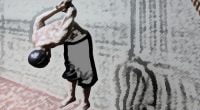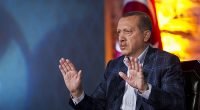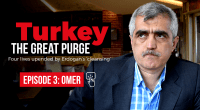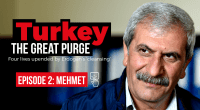Keyword: Military coups in Turkey

US Congressman: No Credibility In Charges By Turkey Against Gülen
US Congressman Brad Sherman said on Thursday that charges against US-based Islamic scholar Fethullah Gülen by the Turkish government and Turkey’s autocratic President Recep Tayyip Erdoğan have no credibility and that he would not be treated with justice if he were in Turkey.

Enes Kanter: “I’m getting death threats almost every day”
Appearing on “CBS This Morning” Monday, Kanter said the trouble began while he was in Indonesia: “I was sleeping around 2:30 or something and my manager knocked on my door. He said the Secret Service and the Indonesian army were looking for me because the Turkish government told them I was a dangerous man.

Police officers become victims of torture in Turkey
The families of several Turkish police officers, rounded up as part of the crackdown on the Gulen community, have sought help from human rights activists in a rare example of willingness to speak out on torture allegations that have been rife since the coup attempt last year.

More evidence Erdogan behind coup
While the narrative voiced by Erdogan and echoed by the Turkish press blamed Gülen exclusively, many Turks and diplomats quietly harbored suspicions that Erdogan planned and staged the coup himself as a Turkish equivalent of the Reichstag Fire. That may once have sounded like a fringe conspiracy, but increasingly it seems the likely genesis of events last July.

The Turkey I no longer know
The Turkish population already is strongly polarized on the AKP regime. A Turkey under a dictatorial regime, providing haven to violent radicals and pushing its Kurdish citizens into desperation, would be a nightmare for Middle East security. I probably will not live to see Turkey become an exemplary democracy, but I pray that the downward authoritarian drift can be stopped before it is too late.

Erdogan’s Faux Coup may have been Turkey’s Reichstag Fire
Michael Rubin of the American Enterprise Institute just gave us a pat on the back confirming our original assessment of July 2016 that Erdogan had staged the July 2016 coup. Several career Turkish military officers make a persuasive case that Erdogan’s narrative is false and that the coup was essentially Turkey’s equivalent of the Reichstag fire.

Policeman who fought against putchists arrested while getting treatment at hospital
Ekrem Türk, a 34-year old police officer who fought to prevent the advance of army tanks in Turkish capital on the day of failed coup bid of July 15, 2016 was rounded up while he was getting treatment at a private hospital in Ankara.

Turkish officers speak: Erdogan may have staged coup
So, if Erdogan’s narrative is flawed, what are the alternative theories? On the surface, much doesn’t add up. Now, several career Turkish military officers — none of whom are followers or supporters of Gülen — have compiled from open sources a lengthy report analyzing the coup. They have authorized me to share the Dropbox link where they have made it accessible.

Wife: Jailed Former Prosecutor, Heavy Cancer Patient, Needs Urgent Health Care
Prosecutor Kuriş was detained over allegations over involvement into coup attempt despite he was in rest at home because of his serious sickness, cancer. However, the biased forensic medicine department has always issued reports claiming that Prosecutor Kuriş is eligible to stay in prison conditions.

Turkey, The great purge – Four lives upturned by Erdogan’s ‘cleansing.’ Episode 4 – Betul
Every afternoon from January 23 to March 28, Ms. Celep arrived at the square wearing a white traffic waistcoat emblazoned with the words, “İşimi geri istiyorum” – Turkish for “I want my job back”. Through sunshine and the shivering Istanbul rain, she stood there as supporters — many of whom had also lost their jobs in Turkey’s great purges — arrived to cheer her on, encouraged by the young woman’s sheer guts and charisma.

Turkey, The great purge – Four lives upturned by Erdogan’s ‘cleansing.’ Episode 3 – Omer
It was a tweet that set it all off. An innocuous post that plunged Omer Faruk Gergerlioglu into a personal, administrative and political hell — and a private trauma that has publicly exposed a growing rift within Turkey’s Islamists.

Inside Turkey’s Purge
The police officers came to the doctor’s door in Istanbul at 6 a.m. and one of them said, “You are accused of attempting to kill President Erdogan.” The doctor couldn’t help it; he laughed. “Really? I did that?” The police officers smiled, too. “Yes. Also for attempting to destroy Turkey and for being a member of a terrorist organization.”

Turkey, The great purge – Four lives upturned by Erdogan’s ‘cleansing.’ Episode 2 – Mehmet
Following the July 15, 2016, coup attempt, Erdogan promised to “cleanse” Turkey of a “virus” that has plagued its state institutions. That cleansing has been primarily directed at two organisations: the PKK and the Gulen movement. But the crackdown on both organisations began long before the July coup attempt.



















